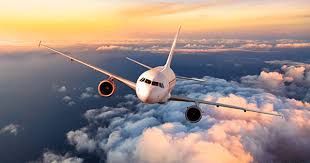By Gabriel Agbeja, News Agency of Nigeria (NAN)
Lately, the question of whether to switch off one’s phone or put it in airplane mode during flights has become a subject of controversy in Nigeria.
Altercations have also ensued between flight crews and passengers over failure of the latter to switch off phones.
When it comes to using phones during a flight, the debate often centres on safety, compliance with regulations, and passenger convenience.
Putting one’s phone in airplane mode disables the phone’s cellular, Wi-Fi, and Bluetooth connections, which can interfere with the plane’s communication and navigation systems.
In airplane mode, one can still use one’s phone for offline activities like reading, playing games, or listening to music.
When switched off, it means completely powering off phone to ensure it does not emit any signals that could potentially interfere with the plane’s systems.
Weighing in on the contention, Mr Adulmalik Jibrill, Intergovernmental Affairs, Charter and Business Development Manager, Aero Contractors in Abuja, said both airplane mode and switching off phone could be safe options during flights.
Jibrill, however, explained that airplane mode was generally recommended, as airplane mode allowed one to use one’s phone for offline activities while minimising potential interference.
He, however, advised the passengers to always follow the airline’s guidelines and instructions from the flight crew.
“Always follow the flight crew’s instructions regarding phone usage during flights.
“If you need to use your phone during the flight, switch to airplane mode to minimise potential interference.
“Refrain from using your cellular network during the flight, as it can cause interference with the plane’s communication systems.
“Airplane mode reduces the risk of interference with the plane’s communication and navigation systems.
“Using airplane mode helps comply with aviation regulations and ensures a safe flight.’’
According to him, airlines typically require that all electronic devices be switched to airplane mode for the duration of the flight that disables the device’s communication functions (cellular, Wi-Fi, and Bluetooth), reducing the risk of interference with the aircraft’s navigation and communication systems.
Jibrill buttressed on safety considerations.
He said that while modern aircraft was designed to withstand any possible interference from personal electronic devices, the precautionary measures remained in place to eliminate any potential risk.
“Having devices in airplane mode ensures that passengers remain attentive to safety briefings and announcements.
“Keeping devices switched off or in airplane mode conserves battery life and reduces the potential for distractions, allowing passengers to remain aware of their surroundings and any safety instructions,’’ he said.
He reiterated that complying with airline regulations regarding device use was not only a safety measure but also a legal requirement as non-compliance could lead to penalties for passengers.
Jibrill explained that many airlines allowed the use of Wi-Fi and Bluetooth once the aircraft reached cruising altitude, allowing passengers to use certain functions of their devices while still complying with safety protocols.
He further stressed that it was essential for passengers to follow the guidelines provided by airlines to contribute to a safe flying experience for everyone on board.
Meanwhile, the Nigeria Civil Aviation Authority (NCAA) has ordered that all mobile phones should be switched off during flight on all Nigerian airlines.
NCAA Director-General, Capt.Chris Najomo, gave the directive recently at an “Emergency National Civil Aviation Security Committee and Stakeholders Meeting“.
The aim of the meeting was to urgently collectively strengthen aviation security and restore public confidence following incidents of passenger unruliness and system lapses.
“Nothing like airplane mode during flight on all Nigerian airlines again.
“To avoid ambiguity and perceived confusion, all mobile phones, and other portable electronic devices should be switched off during, at least, the critical phase of flight on all Nigerian airlines.
“Flight mode is no longer allowed; all phones must be switched off.”
Najomo directed air operators in the country to amend their operations’ manual to reflect the requirement and submit same to the NCAA for approval.
He added that the authority would remain alert to future review of the requirement as aircraft technological and safety enhancement improved risk assessment results.
“It is the responsibility of the crew to communicate this requirement to passengers, and is also the responsibility of the passengers to comply with crew instructions.”
The director-general urged stakeholders to reaffirm their commitment to aviation security and the safety of the people.
Najomo said aviation security was everyone’s responsibility, adding that timely information sharing would be needed for effective performance.
“The threats we face in aviation stem from deliberate or attempted sabotage, non-compliance with aviation protocols by traveling public, non-implementation of approved standard operating procedures by service providers.”
Najomo assured that the NCAA would intensify effort by spearheading adherence to national and international standards.
The NCAA boss said the service providers would need to revise screening protocols and ensure transparent, swift, accountable training.
“We are going to do a mock response next week; we are going to carry it out in Lagos and Abuja, and come up with a result.
“Aviation security personnel and law enforcement must be reinforced with training, professionalism, and clearly defined rules of engagement.
“All stakeholders, from airlines to intelligence partners, must work without silos to share threat intelligence and coordinate rapid response, “he said.
Mr Michael Achimugu, Director Consumer Protection and Public Affairs, NCAA, said during a presentation, that security entailed deciding what method was best under each circumstance during flight.
Achimugu, who talked on a topic “Unruly Passenger Behaviour: A Consumer Protection Perspective,’’ said that uncooperative suspects were handled differently from a cooperating suspect.
“This is global; in Nigeria, we are even more humane; in most cases abroad, even if you cooperate, unruly behavior is treated with extreme prejudice.’’
He said aviation security must step up regulatory enforcement to become more consistent and stringent.
More so, Group Capt. John Ojikutu, the Chief Executive Officer, Centurion Securities and Centurion Aviation, said that switching phone off on board any commercial passengers flights was part of safety regulations for airlines and programme by the airlines in Nigeria for the compliance.
“I am not an electronic expert but knowledgeable in aviation security; the problems in the Nigeria Civil Aviation is that everyone in it is self-regulated including the passengers.
“With the Value JET and Ibom Air cases, I have recommended that on domestic flights which usually are not more than an hour, envelopes be provided for each passengers to put in their phones, sealed, collected and returned to them when landing.
“The neglect in the compliance to the regulations and the oversight of the regulatory authority on compliance are the results of the operators self-regulated including the passengers and the defaults we are seeing daily now in the air travelling.’’
According to him, there are ways that different electronic systems operating in different environments affect their operations.
He said that the regulatory authority and airlines ought to show concerns about the burning issue.
“In the middle age of aviation when tickets were issued to passengers, the DON’Ts were written at the back of the tickets.
“Later, as the electronic tickets became a cheaper alternative the DON’Ts were displayed at the Checking-in-Counters, Access Point, Screening Checkpoints, among others.
“Where in the airports can you find these? How effective are the regulatory authority oversight and enforcement of compliant to the regulations?
“Let us start from the operators and the responsible regulatory authority; how many of the passengers understand the reasons for the in flights announcements?’’, he said.
According to him, when the operators are not making the display of DON’Ts available to the passengers and the responsible safety authorities are not enforcing regulations on the operators, safety default cases on the passengers cannot be won.
As we soar through the skies, it is essential to prioritise safety in every aspect of our flight experience.
Experts say when it comes to phone usage on flights, switching off and airplane mode both have their merits, but following airline guidelines is paramount.(NANFeatures)












